People Management Report: Effective People Management at Tesco
VerifiedAdded on 2022/12/30
|12
|2703
|100
Report
AI Summary
This report provides a comprehensive overview of people management practices within Tesco, a leading retail organization. It delves into contemporary challenges faced by line management, such as innovation, automation, and the need for effective training and development programs. The report highlights essential knowledge, skills, and behaviors required for HR professionals, including team building and motivation theories like Maslow's Hierarchy of Needs. Furthermore, it explores various HR processes and support systems, such as performance management reviews and 360-degree appraisals, used to assess and enhance employee performance. The report concludes with recommendations for improving people management within the organization, emphasizing the importance of clear HR policies, job descriptions, and regular performance evaluations. Overall, the report provides valuable insights into effective people management strategies within a large retail setting, emphasizing the importance of aligning HR practices with organizational goals.

People Management
Paraphrase This Document
Need a fresh take? Get an instant paraphrase of this document with our AI Paraphraser
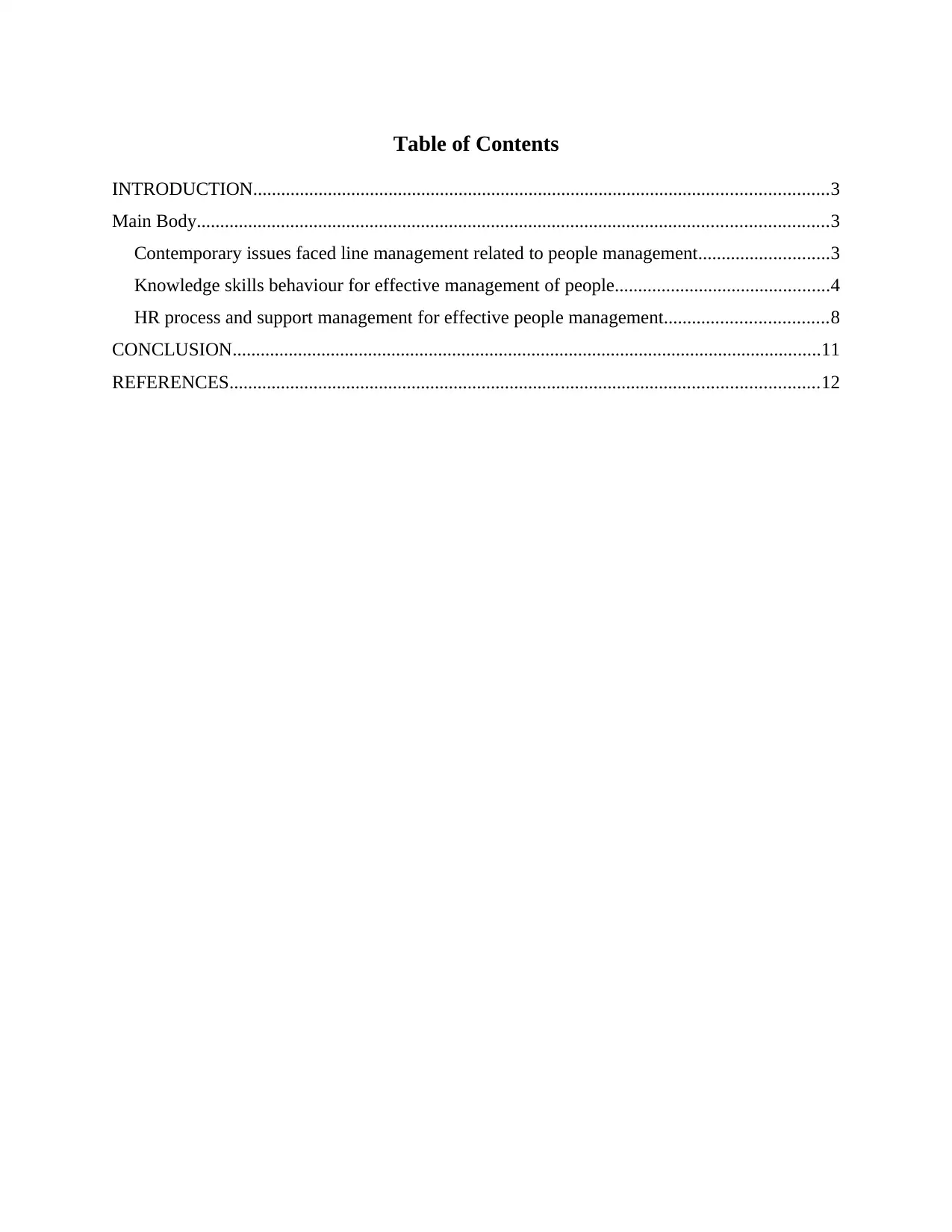
Table of Contents
INTRODUCTION...........................................................................................................................3
Main Body.......................................................................................................................................3
Contemporary issues faced line management related to people management............................3
Knowledge skills behaviour for effective management of people..............................................4
HR process and support management for effective people management...................................8
CONCLUSION..............................................................................................................................11
REFERENCES..............................................................................................................................12
INTRODUCTION...........................................................................................................................3
Main Body.......................................................................................................................................3
Contemporary issues faced line management related to people management............................3
Knowledge skills behaviour for effective management of people..............................................4
HR process and support management for effective people management...................................8
CONCLUSION..............................................................................................................................11
REFERENCES..............................................................................................................................12
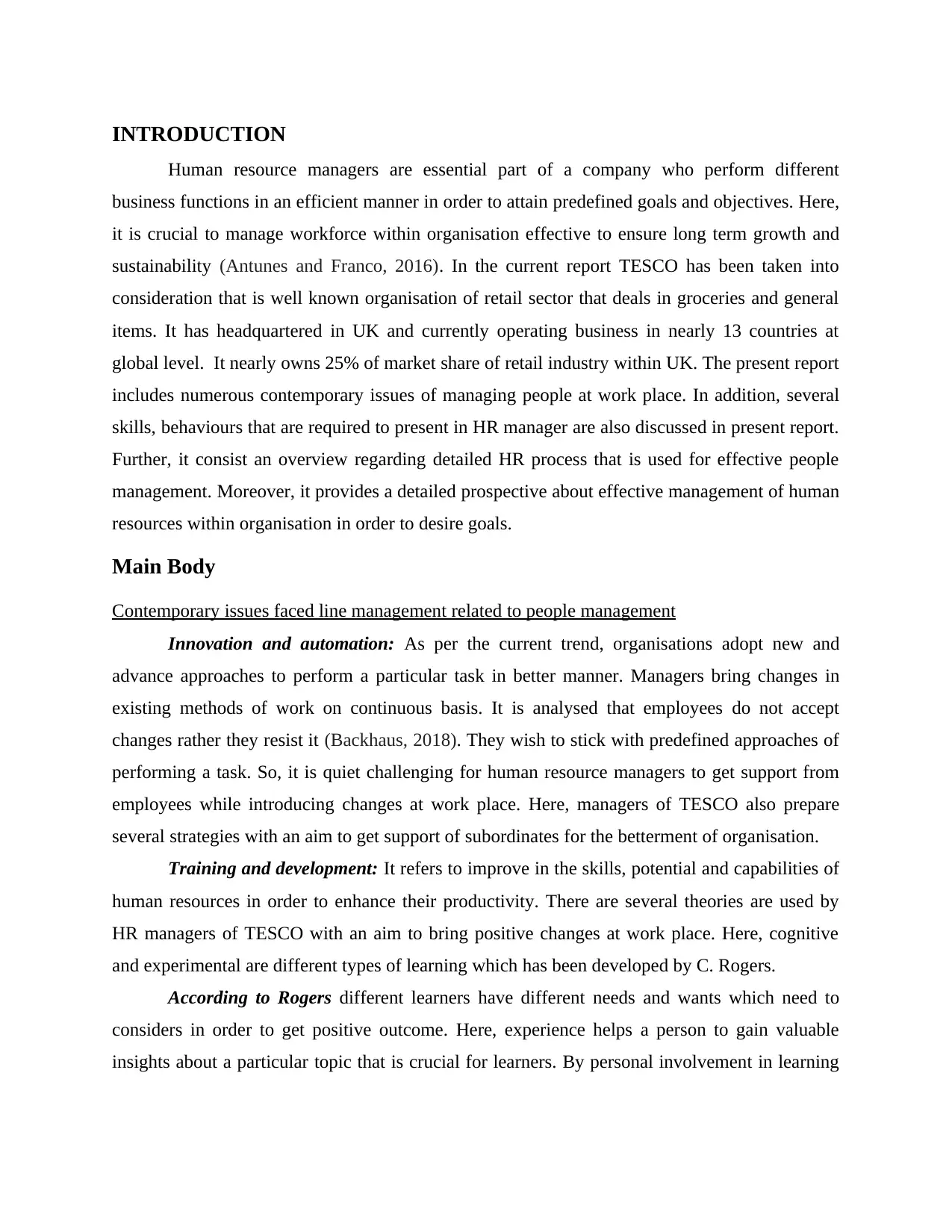
INTRODUCTION
Human resource managers are essential part of a company who perform different
business functions in an efficient manner in order to attain predefined goals and objectives. Here,
it is crucial to manage workforce within organisation effective to ensure long term growth and
sustainability (Antunes and Franco, 2016). In the current report TESCO has been taken into
consideration that is well known organisation of retail sector that deals in groceries and general
items. It has headquartered in UK and currently operating business in nearly 13 countries at
global level. It nearly owns 25% of market share of retail industry within UK. The present report
includes numerous contemporary issues of managing people at work place. In addition, several
skills, behaviours that are required to present in HR manager are also discussed in present report.
Further, it consist an overview regarding detailed HR process that is used for effective people
management. Moreover, it provides a detailed prospective about effective management of human
resources within organisation in order to desire goals.
Main Body
Contemporary issues faced line management related to people management
Innovation and automation: As per the current trend, organisations adopt new and
advance approaches to perform a particular task in better manner. Managers bring changes in
existing methods of work on continuous basis. It is analysed that employees do not accept
changes rather they resist it (Backhaus, 2018). They wish to stick with predefined approaches of
performing a task. So, it is quiet challenging for human resource managers to get support from
employees while introducing changes at work place. Here, managers of TESCO also prepare
several strategies with an aim to get support of subordinates for the betterment of organisation.
Training and development: It refers to improve in the skills, potential and capabilities of
human resources in order to enhance their productivity. There are several theories are used by
HR managers of TESCO with an aim to bring positive changes at work place. Here, cognitive
and experimental are different types of learning which has been developed by C. Rogers.
According to Rogers different learners have different needs and wants which need to
considers in order to get positive outcome. Here, experience helps a person to gain valuable
insights about a particular topic that is crucial for learners. By personal involvement in learning
Human resource managers are essential part of a company who perform different
business functions in an efficient manner in order to attain predefined goals and objectives. Here,
it is crucial to manage workforce within organisation effective to ensure long term growth and
sustainability (Antunes and Franco, 2016). In the current report TESCO has been taken into
consideration that is well known organisation of retail sector that deals in groceries and general
items. It has headquartered in UK and currently operating business in nearly 13 countries at
global level. It nearly owns 25% of market share of retail industry within UK. The present report
includes numerous contemporary issues of managing people at work place. In addition, several
skills, behaviours that are required to present in HR manager are also discussed in present report.
Further, it consist an overview regarding detailed HR process that is used for effective people
management. Moreover, it provides a detailed prospective about effective management of human
resources within organisation in order to desire goals.
Main Body
Contemporary issues faced line management related to people management
Innovation and automation: As per the current trend, organisations adopt new and
advance approaches to perform a particular task in better manner. Managers bring changes in
existing methods of work on continuous basis. It is analysed that employees do not accept
changes rather they resist it (Backhaus, 2018). They wish to stick with predefined approaches of
performing a task. So, it is quiet challenging for human resource managers to get support from
employees while introducing changes at work place. Here, managers of TESCO also prepare
several strategies with an aim to get support of subordinates for the betterment of organisation.
Training and development: It refers to improve in the skills, potential and capabilities of
human resources in order to enhance their productivity. There are several theories are used by
HR managers of TESCO with an aim to bring positive changes at work place. Here, cognitive
and experimental are different types of learning which has been developed by C. Rogers.
According to Rogers different learners have different needs and wants which need to
considers in order to get positive outcome. Here, experience helps a person to gain valuable
insights about a particular topic that is crucial for learners. By personal involvement in learning
⊘ This is a preview!⊘
Do you want full access?
Subscribe today to unlock all pages.

Trusted by 1+ million students worldwide
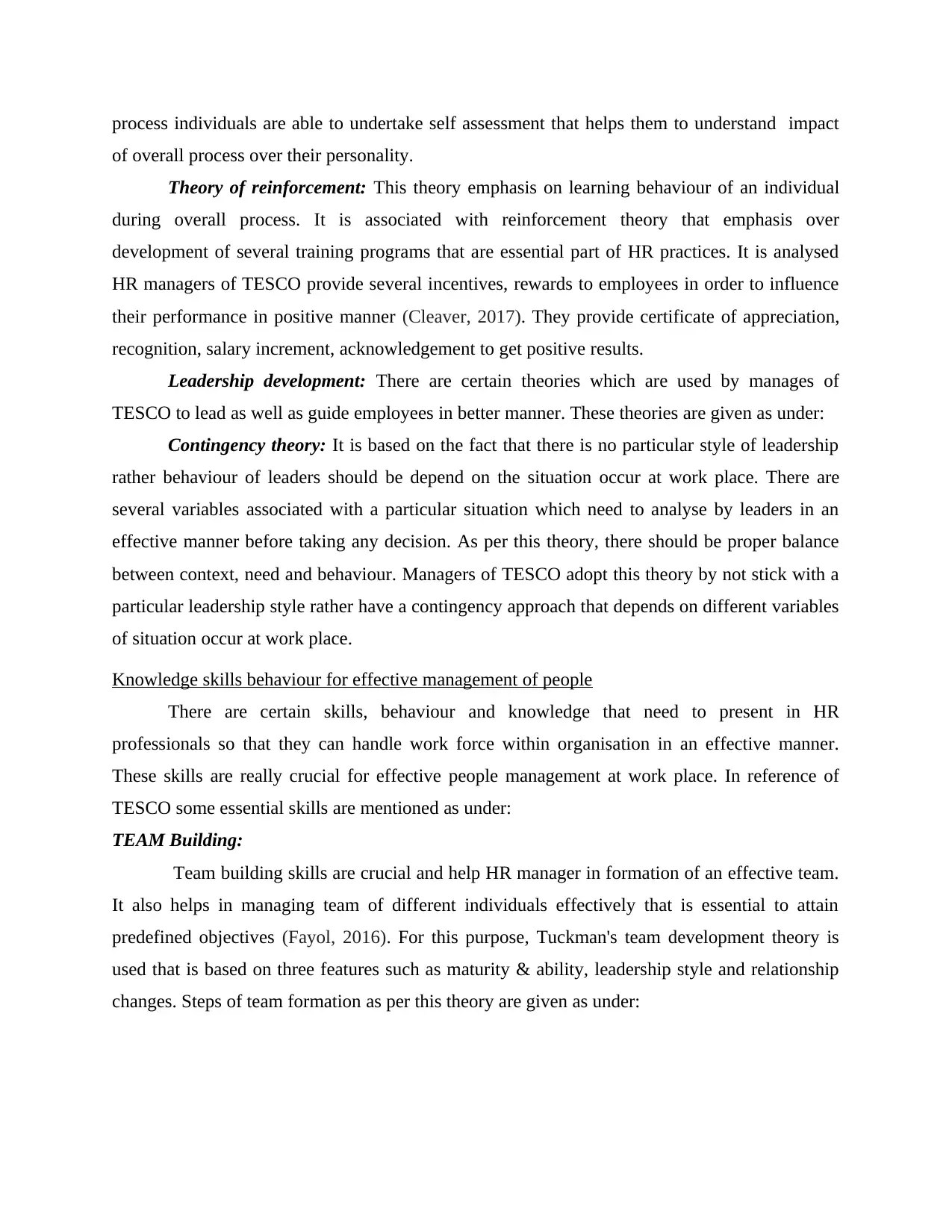
process individuals are able to undertake self assessment that helps them to understand impact
of overall process over their personality.
Theory of reinforcement: This theory emphasis on learning behaviour of an individual
during overall process. It is associated with reinforcement theory that emphasis over
development of several training programs that are essential part of HR practices. It is analysed
HR managers of TESCO provide several incentives, rewards to employees in order to influence
their performance in positive manner (Cleaver, 2017). They provide certificate of appreciation,
recognition, salary increment, acknowledgement to get positive results.
Leadership development: There are certain theories which are used by manages of
TESCO to lead as well as guide employees in better manner. These theories are given as under:
Contingency theory: It is based on the fact that there is no particular style of leadership
rather behaviour of leaders should be depend on the situation occur at work place. There are
several variables associated with a particular situation which need to analyse by leaders in an
effective manner before taking any decision. As per this theory, there should be proper balance
between context, need and behaviour. Managers of TESCO adopt this theory by not stick with a
particular leadership style rather have a contingency approach that depends on different variables
of situation occur at work place.
Knowledge skills behaviour for effective management of people
There are certain skills, behaviour and knowledge that need to present in HR
professionals so that they can handle work force within organisation in an effective manner.
These skills are really crucial for effective people management at work place. In reference of
TESCO some essential skills are mentioned as under:
TEAM Building:
Team building skills are crucial and help HR manager in formation of an effective team.
It also helps in managing team of different individuals effectively that is essential to attain
predefined objectives (Fayol, 2016). For this purpose, Tuckman's team development theory is
used that is based on three features such as maturity & ability, leadership style and relationship
changes. Steps of team formation as per this theory are given as under:
of overall process over their personality.
Theory of reinforcement: This theory emphasis on learning behaviour of an individual
during overall process. It is associated with reinforcement theory that emphasis over
development of several training programs that are essential part of HR practices. It is analysed
HR managers of TESCO provide several incentives, rewards to employees in order to influence
their performance in positive manner (Cleaver, 2017). They provide certificate of appreciation,
recognition, salary increment, acknowledgement to get positive results.
Leadership development: There are certain theories which are used by manages of
TESCO to lead as well as guide employees in better manner. These theories are given as under:
Contingency theory: It is based on the fact that there is no particular style of leadership
rather behaviour of leaders should be depend on the situation occur at work place. There are
several variables associated with a particular situation which need to analyse by leaders in an
effective manner before taking any decision. As per this theory, there should be proper balance
between context, need and behaviour. Managers of TESCO adopt this theory by not stick with a
particular leadership style rather have a contingency approach that depends on different variables
of situation occur at work place.
Knowledge skills behaviour for effective management of people
There are certain skills, behaviour and knowledge that need to present in HR
professionals so that they can handle work force within organisation in an effective manner.
These skills are really crucial for effective people management at work place. In reference of
TESCO some essential skills are mentioned as under:
TEAM Building:
Team building skills are crucial and help HR manager in formation of an effective team.
It also helps in managing team of different individuals effectively that is essential to attain
predefined objectives (Fayol, 2016). For this purpose, Tuckman's team development theory is
used that is based on three features such as maturity & ability, leadership style and relationship
changes. Steps of team formation as per this theory are given as under:
Paraphrase This Document
Need a fresh take? Get an instant paraphrase of this document with our AI Paraphraser
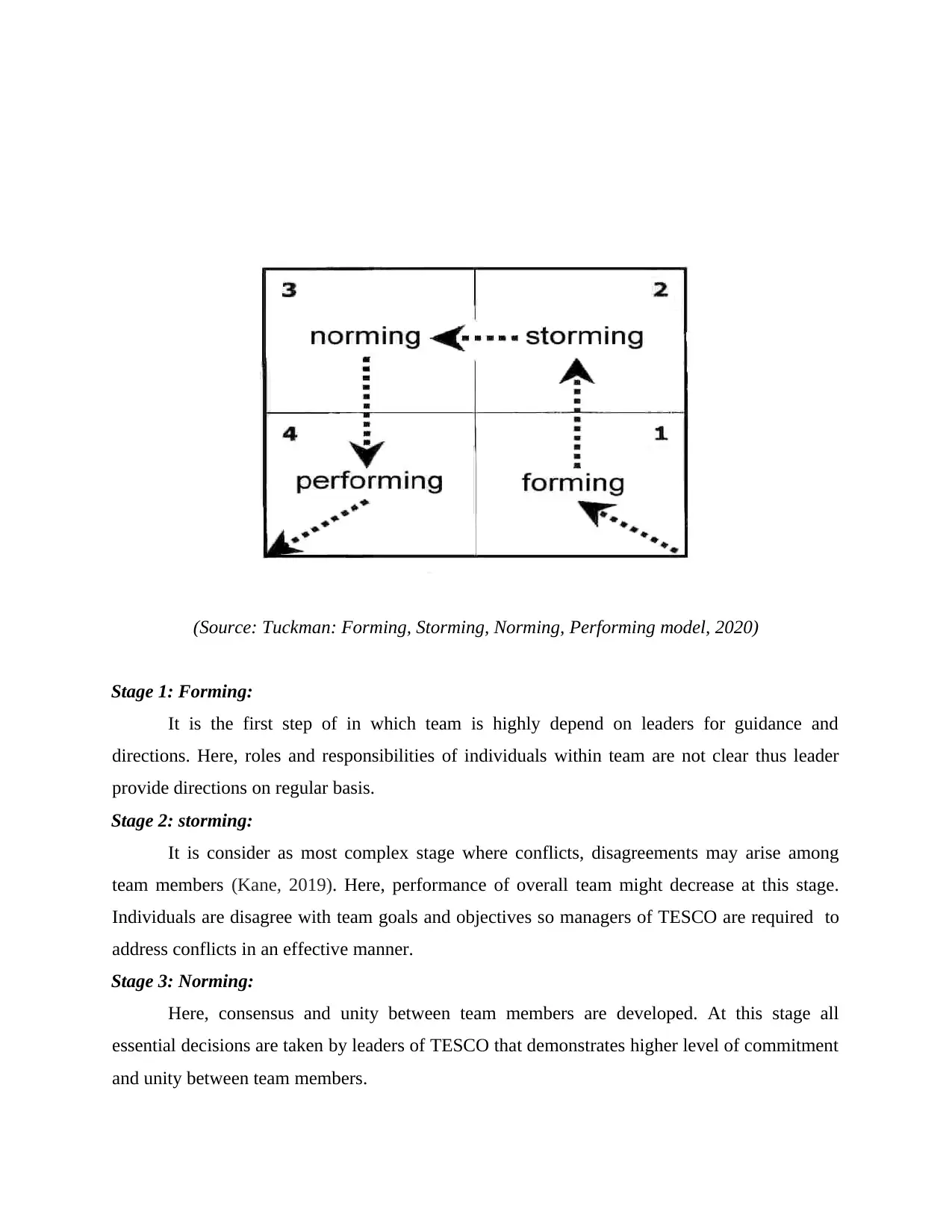
(Source: Tuckman: Forming, Storming, Norming, Performing model, 2020)
Stage 1: Forming:
It is the first step of in which team is highly depend on leaders for guidance and
directions. Here, roles and responsibilities of individuals within team are not clear thus leader
provide directions on regular basis.
Stage 2: storming:
It is consider as most complex stage where conflicts, disagreements may arise among
team members (Kane, 2019). Here, performance of overall team might decrease at this stage.
Individuals are disagree with team goals and objectives so managers of TESCO are required to
address conflicts in an effective manner.
Stage 3: Norming:
Here, consensus and unity between team members are developed. At this stage all
essential decisions are taken by leaders of TESCO that demonstrates higher level of commitment
and unity between team members.
Stage 1: Forming:
It is the first step of in which team is highly depend on leaders for guidance and
directions. Here, roles and responsibilities of individuals within team are not clear thus leader
provide directions on regular basis.
Stage 2: storming:
It is consider as most complex stage where conflicts, disagreements may arise among
team members (Kane, 2019). Here, performance of overall team might decrease at this stage.
Individuals are disagree with team goals and objectives so managers of TESCO are required to
address conflicts in an effective manner.
Stage 3: Norming:
Here, consensus and unity between team members are developed. At this stage all
essential decisions are taken by leaders of TESCO that demonstrates higher level of commitment
and unity between team members.
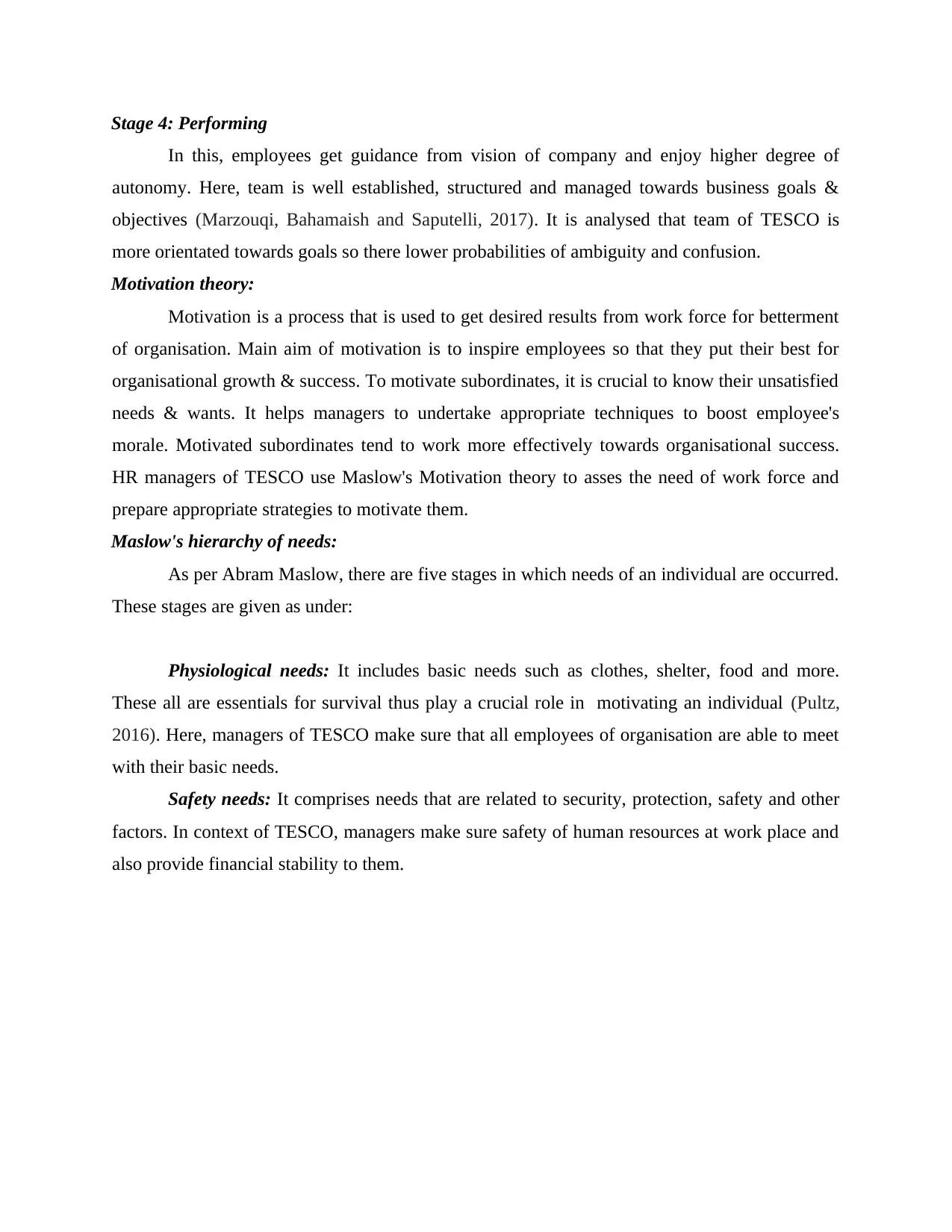
Stage 4: Performing
In this, employees get guidance from vision of company and enjoy higher degree of
autonomy. Here, team is well established, structured and managed towards business goals &
objectives (Marzouqi, Bahamaish and Saputelli, 2017). It is analysed that team of TESCO is
more orientated towards goals so there lower probabilities of ambiguity and confusion.
Motivation theory:
Motivation is a process that is used to get desired results from work force for betterment
of organisation. Main aim of motivation is to inspire employees so that they put their best for
organisational growth & success. To motivate subordinates, it is crucial to know their unsatisfied
needs & wants. It helps managers to undertake appropriate techniques to boost employee's
morale. Motivated subordinates tend to work more effectively towards organisational success.
HR managers of TESCO use Maslow's Motivation theory to asses the need of work force and
prepare appropriate strategies to motivate them.
Maslow's hierarchy of needs:
As per Abram Maslow, there are five stages in which needs of an individual are occurred.
These stages are given as under:
Physiological needs: It includes basic needs such as clothes, shelter, food and more.
These all are essentials for survival thus play a crucial role in motivating an individual (Pultz,
2016). Here, managers of TESCO make sure that all employees of organisation are able to meet
with their basic needs.
Safety needs: It comprises needs that are related to security, protection, safety and other
factors. In context of TESCO, managers make sure safety of human resources at work place and
also provide financial stability to them.
In this, employees get guidance from vision of company and enjoy higher degree of
autonomy. Here, team is well established, structured and managed towards business goals &
objectives (Marzouqi, Bahamaish and Saputelli, 2017). It is analysed that team of TESCO is
more orientated towards goals so there lower probabilities of ambiguity and confusion.
Motivation theory:
Motivation is a process that is used to get desired results from work force for betterment
of organisation. Main aim of motivation is to inspire employees so that they put their best for
organisational growth & success. To motivate subordinates, it is crucial to know their unsatisfied
needs & wants. It helps managers to undertake appropriate techniques to boost employee's
morale. Motivated subordinates tend to work more effectively towards organisational success.
HR managers of TESCO use Maslow's Motivation theory to asses the need of work force and
prepare appropriate strategies to motivate them.
Maslow's hierarchy of needs:
As per Abram Maslow, there are five stages in which needs of an individual are occurred.
These stages are given as under:
Physiological needs: It includes basic needs such as clothes, shelter, food and more.
These all are essentials for survival thus play a crucial role in motivating an individual (Pultz,
2016). Here, managers of TESCO make sure that all employees of organisation are able to meet
with their basic needs.
Safety needs: It comprises needs that are related to security, protection, safety and other
factors. In context of TESCO, managers make sure safety of human resources at work place and
also provide financial stability to them.
⊘ This is a preview!⊘
Do you want full access?
Subscribe today to unlock all pages.

Trusted by 1+ million students worldwide
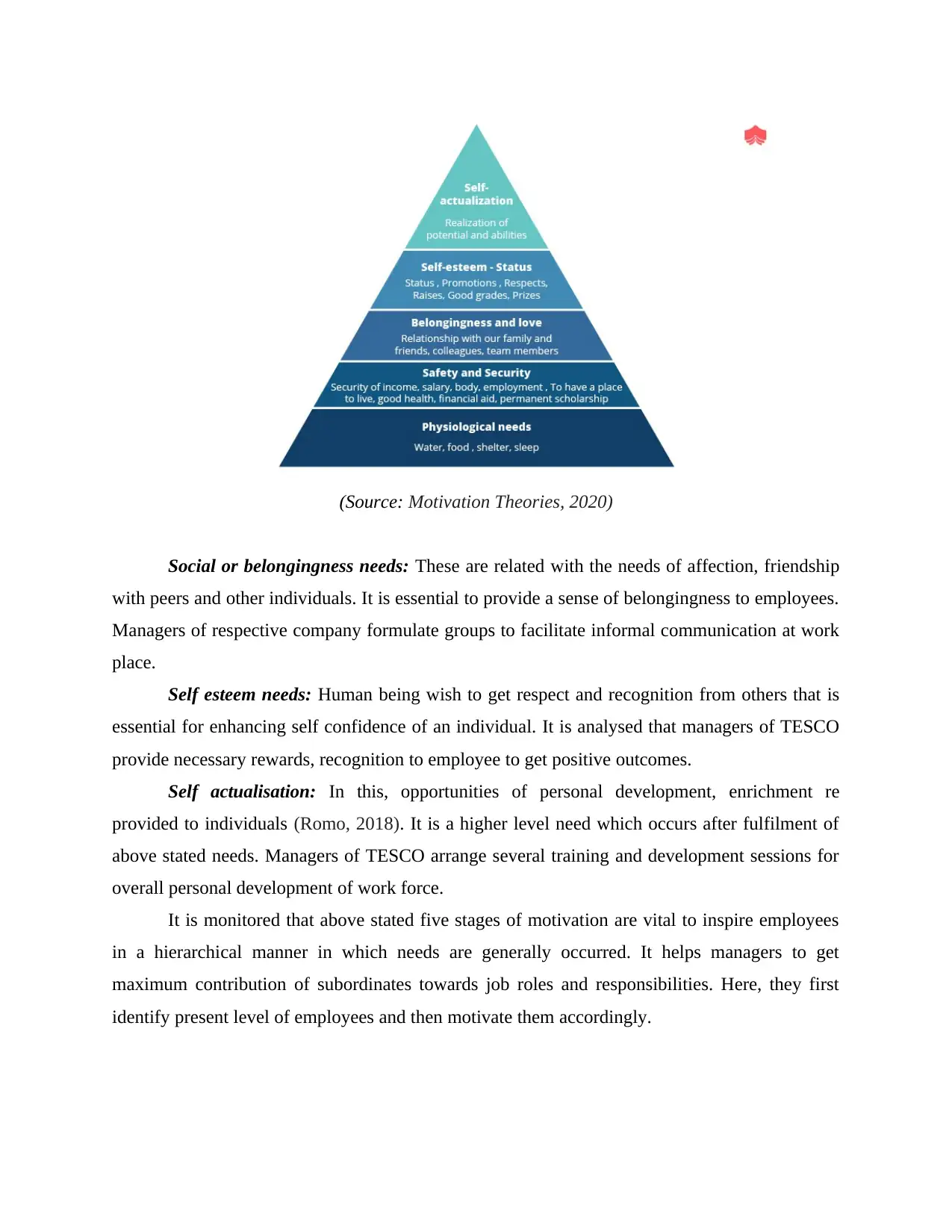
(Source: Motivation Theories, 2020)
Social or belongingness needs: These are related with the needs of affection, friendship
with peers and other individuals. It is essential to provide a sense of belongingness to employees.
Managers of respective company formulate groups to facilitate informal communication at work
place.
Self esteem needs: Human being wish to get respect and recognition from others that is
essential for enhancing self confidence of an individual. It is analysed that managers of TESCO
provide necessary rewards, recognition to employee to get positive outcomes.
Self actualisation: In this, opportunities of personal development, enrichment re
provided to individuals (Romo, 2018). It is a higher level need which occurs after fulfilment of
above stated needs. Managers of TESCO arrange several training and development sessions for
overall personal development of work force.
It is monitored that above stated five stages of motivation are vital to inspire employees
in a hierarchical manner in which needs are generally occurred. It helps managers to get
maximum contribution of subordinates towards job roles and responsibilities. Here, they first
identify present level of employees and then motivate them accordingly.
Social or belongingness needs: These are related with the needs of affection, friendship
with peers and other individuals. It is essential to provide a sense of belongingness to employees.
Managers of respective company formulate groups to facilitate informal communication at work
place.
Self esteem needs: Human being wish to get respect and recognition from others that is
essential for enhancing self confidence of an individual. It is analysed that managers of TESCO
provide necessary rewards, recognition to employee to get positive outcomes.
Self actualisation: In this, opportunities of personal development, enrichment re
provided to individuals (Romo, 2018). It is a higher level need which occurs after fulfilment of
above stated needs. Managers of TESCO arrange several training and development sessions for
overall personal development of work force.
It is monitored that above stated five stages of motivation are vital to inspire employees
in a hierarchical manner in which needs are generally occurred. It helps managers to get
maximum contribution of subordinates towards job roles and responsibilities. Here, they first
identify present level of employees and then motivate them accordingly.
Paraphrase This Document
Need a fresh take? Get an instant paraphrase of this document with our AI Paraphraser
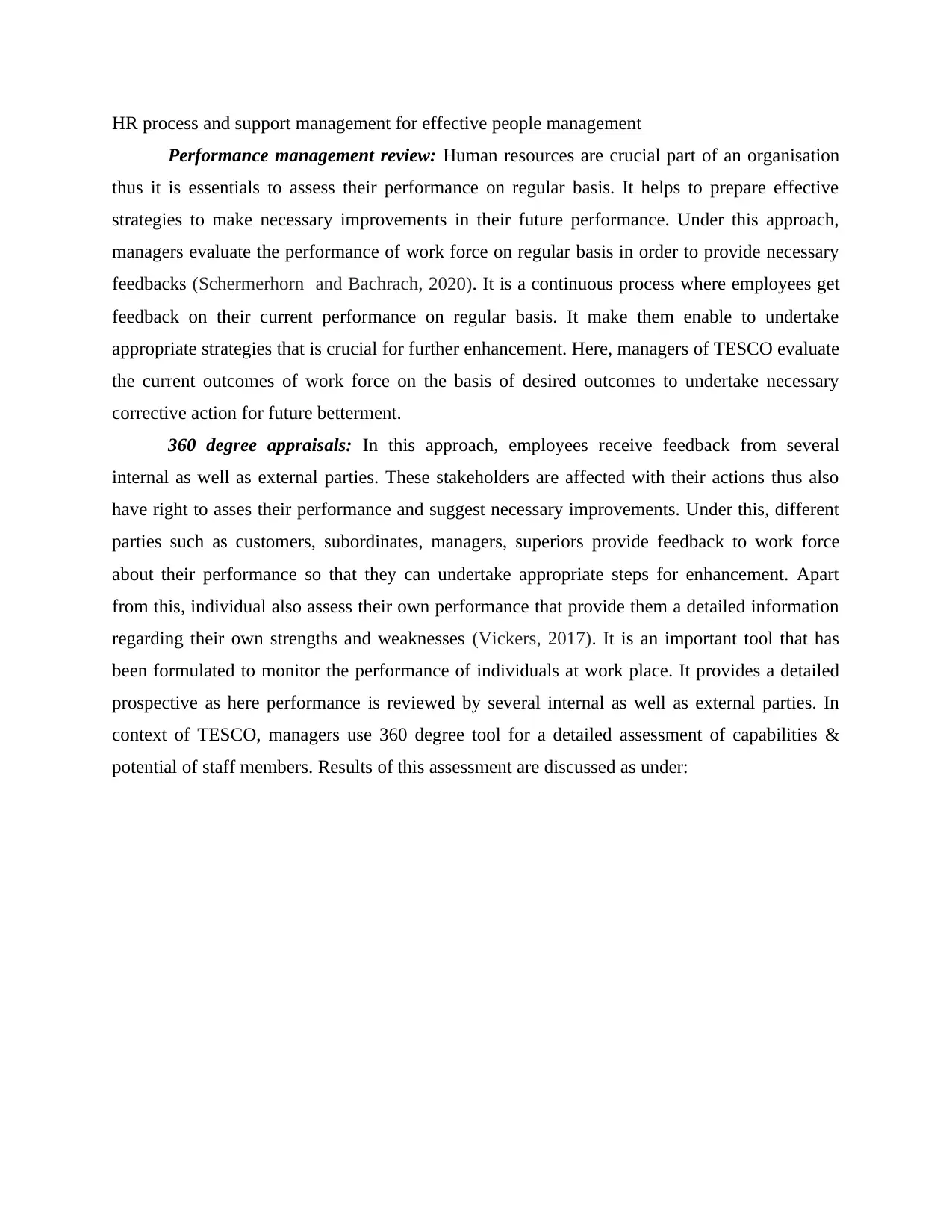
HR process and support management for effective people management
Performance management review: Human resources are crucial part of an organisation
thus it is essentials to assess their performance on regular basis. It helps to prepare effective
strategies to make necessary improvements in their future performance. Under this approach,
managers evaluate the performance of work force on regular basis in order to provide necessary
feedbacks (Schermerhorn and Bachrach, 2020). It is a continuous process where employees get
feedback on their current performance on regular basis. It make them enable to undertake
appropriate strategies that is crucial for further enhancement. Here, managers of TESCO evaluate
the current outcomes of work force on the basis of desired outcomes to undertake necessary
corrective action for future betterment.
360 degree appraisals: In this approach, employees receive feedback from several
internal as well as external parties. These stakeholders are affected with their actions thus also
have right to asses their performance and suggest necessary improvements. Under this, different
parties such as customers, subordinates, managers, superiors provide feedback to work force
about their performance so that they can undertake appropriate steps for enhancement. Apart
from this, individual also assess their own performance that provide them a detailed information
regarding their own strengths and weaknesses (Vickers, 2017). It is an important tool that has
been formulated to monitor the performance of individuals at work place. It provides a detailed
prospective as here performance is reviewed by several internal as well as external parties. In
context of TESCO, managers use 360 degree tool for a detailed assessment of capabilities &
potential of staff members. Results of this assessment are discussed as under:
Performance management review: Human resources are crucial part of an organisation
thus it is essentials to assess their performance on regular basis. It helps to prepare effective
strategies to make necessary improvements in their future performance. Under this approach,
managers evaluate the performance of work force on regular basis in order to provide necessary
feedbacks (Schermerhorn and Bachrach, 2020). It is a continuous process where employees get
feedback on their current performance on regular basis. It make them enable to undertake
appropriate strategies that is crucial for further enhancement. Here, managers of TESCO evaluate
the current outcomes of work force on the basis of desired outcomes to undertake necessary
corrective action for future betterment.
360 degree appraisals: In this approach, employees receive feedback from several
internal as well as external parties. These stakeholders are affected with their actions thus also
have right to asses their performance and suggest necessary improvements. Under this, different
parties such as customers, subordinates, managers, superiors provide feedback to work force
about their performance so that they can undertake appropriate steps for enhancement. Apart
from this, individual also assess their own performance that provide them a detailed information
regarding their own strengths and weaknesses (Vickers, 2017). It is an important tool that has
been formulated to monitor the performance of individuals at work place. It provides a detailed
prospective as here performance is reviewed by several internal as well as external parties. In
context of TESCO, managers use 360 degree tool for a detailed assessment of capabilities &
potential of staff members. Results of this assessment are discussed as under:
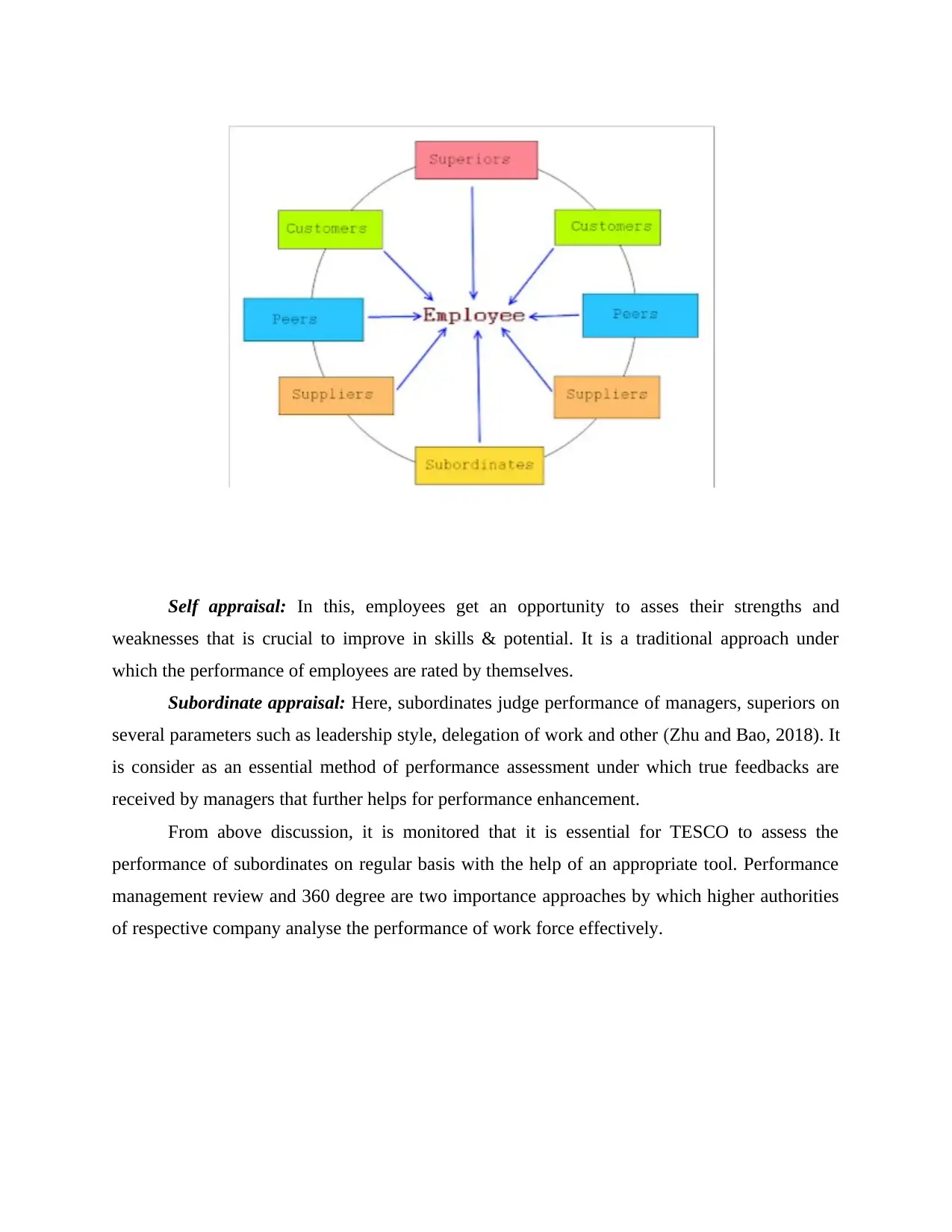
Self appraisal: In this, employees get an opportunity to asses their strengths and
weaknesses that is crucial to improve in skills & potential. It is a traditional approach under
which the performance of employees are rated by themselves.
Subordinate appraisal: Here, subordinates judge performance of managers, superiors on
several parameters such as leadership style, delegation of work and other (Zhu and Bao, 2018). It
is consider as an essential method of performance assessment under which true feedbacks are
received by managers that further helps for performance enhancement.
From above discussion, it is monitored that it is essential for TESCO to assess the
performance of subordinates on regular basis with the help of an appropriate tool. Performance
management review and 360 degree are two importance approaches by which higher authorities
of respective company analyse the performance of work force effectively.
weaknesses that is crucial to improve in skills & potential. It is a traditional approach under
which the performance of employees are rated by themselves.
Subordinate appraisal: Here, subordinates judge performance of managers, superiors on
several parameters such as leadership style, delegation of work and other (Zhu and Bao, 2018). It
is consider as an essential method of performance assessment under which true feedbacks are
received by managers that further helps for performance enhancement.
From above discussion, it is monitored that it is essential for TESCO to assess the
performance of subordinates on regular basis with the help of an appropriate tool. Performance
management review and 360 degree are two importance approaches by which higher authorities
of respective company analyse the performance of work force effectively.
⊘ This is a preview!⊘
Do you want full access?
Subscribe today to unlock all pages.

Trusted by 1+ million students worldwide
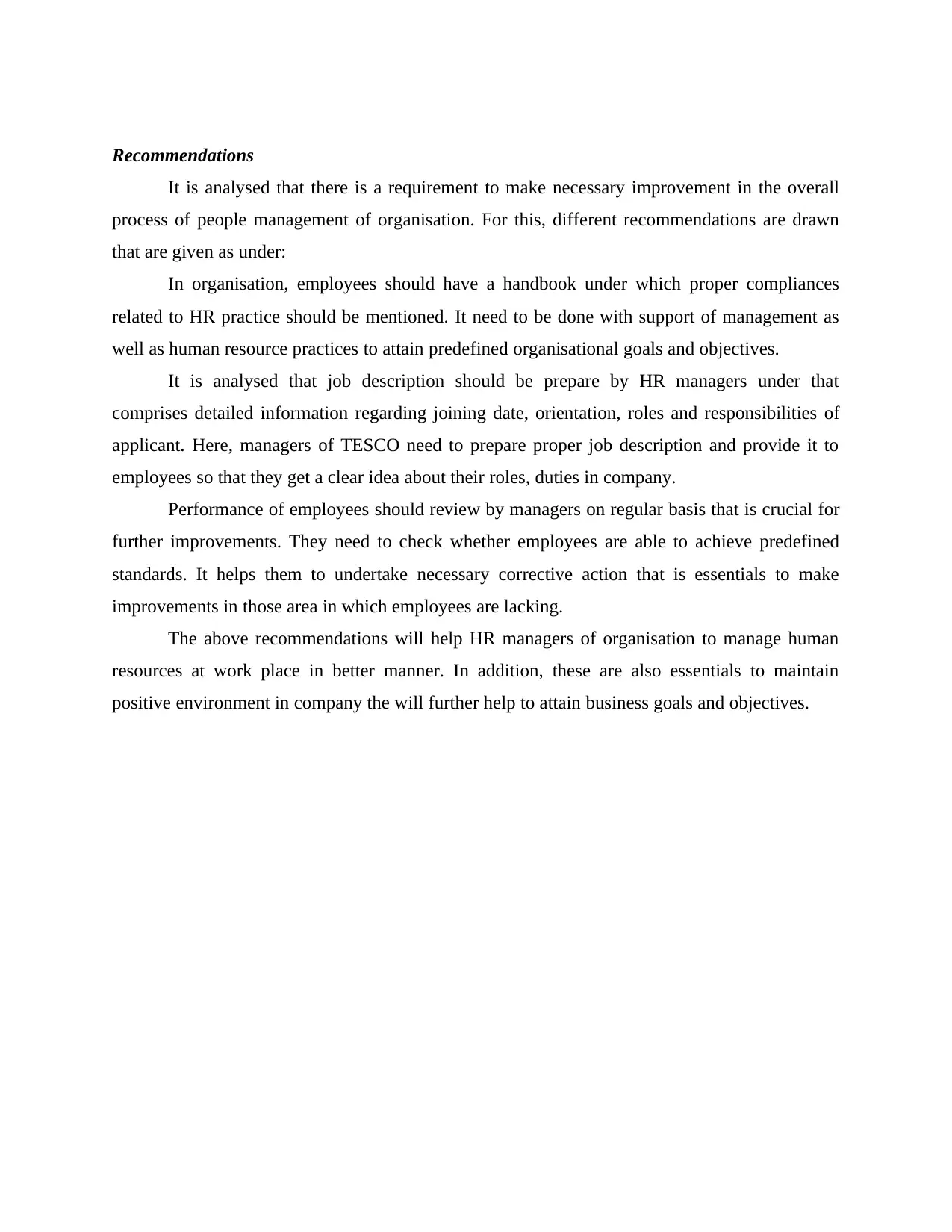
Recommendations
It is analysed that there is a requirement to make necessary improvement in the overall
process of people management of organisation. For this, different recommendations are drawn
that are given as under:
In organisation, employees should have a handbook under which proper compliances
related to HR practice should be mentioned. It need to be done with support of management as
well as human resource practices to attain predefined organisational goals and objectives.
It is analysed that job description should be prepare by HR managers under that
comprises detailed information regarding joining date, orientation, roles and responsibilities of
applicant. Here, managers of TESCO need to prepare proper job description and provide it to
employees so that they get a clear idea about their roles, duties in company.
Performance of employees should review by managers on regular basis that is crucial for
further improvements. They need to check whether employees are able to achieve predefined
standards. It helps them to undertake necessary corrective action that is essentials to make
improvements in those area in which employees are lacking.
The above recommendations will help HR managers of organisation to manage human
resources at work place in better manner. In addition, these are also essentials to maintain
positive environment in company the will further help to attain business goals and objectives.
It is analysed that there is a requirement to make necessary improvement in the overall
process of people management of organisation. For this, different recommendations are drawn
that are given as under:
In organisation, employees should have a handbook under which proper compliances
related to HR practice should be mentioned. It need to be done with support of management as
well as human resource practices to attain predefined organisational goals and objectives.
It is analysed that job description should be prepare by HR managers under that
comprises detailed information regarding joining date, orientation, roles and responsibilities of
applicant. Here, managers of TESCO need to prepare proper job description and provide it to
employees so that they get a clear idea about their roles, duties in company.
Performance of employees should review by managers on regular basis that is crucial for
further improvements. They need to check whether employees are able to achieve predefined
standards. It helps them to undertake necessary corrective action that is essentials to make
improvements in those area in which employees are lacking.
The above recommendations will help HR managers of organisation to manage human
resources at work place in better manner. In addition, these are also essentials to maintain
positive environment in company the will further help to attain business goals and objectives.
Paraphrase This Document
Need a fresh take? Get an instant paraphrase of this document with our AI Paraphraser
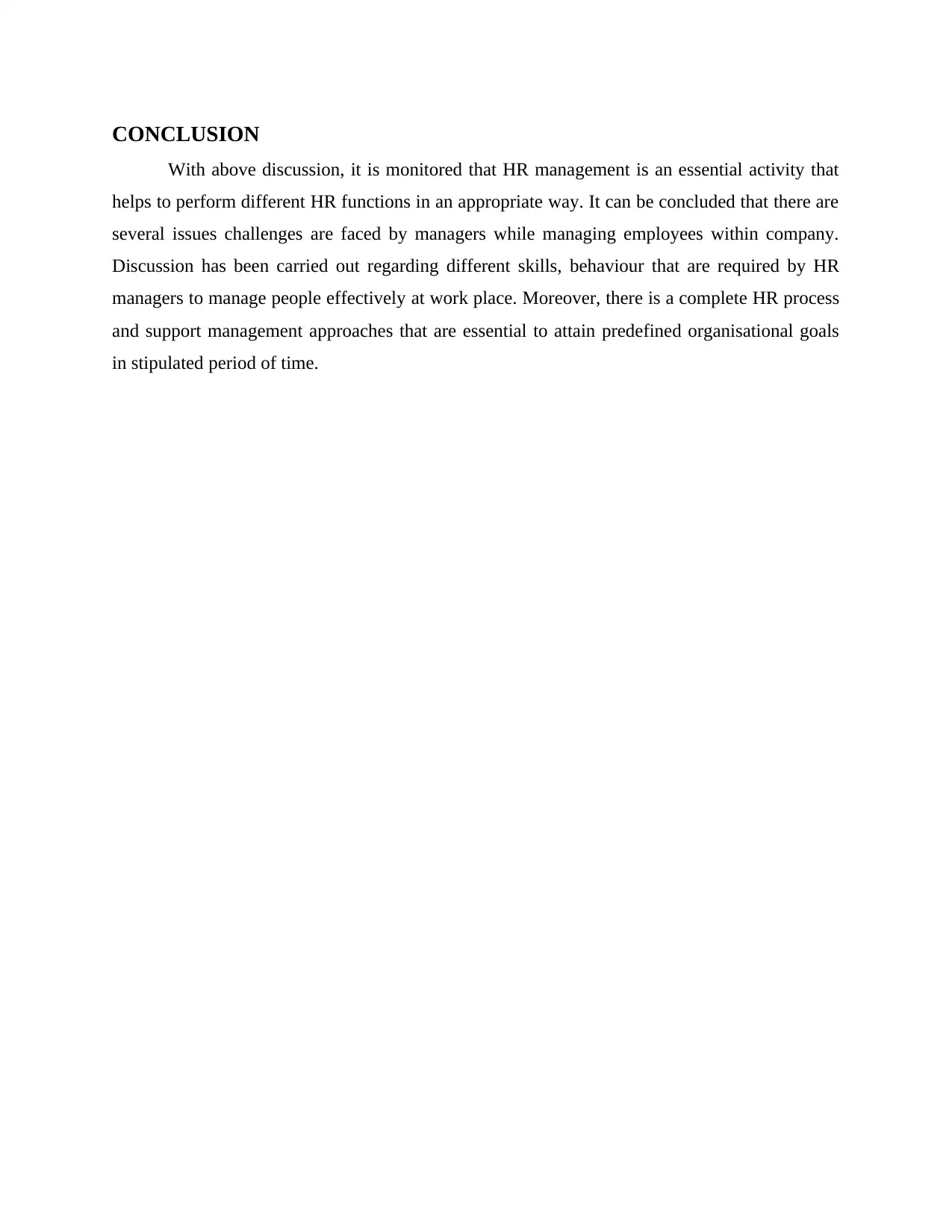
CONCLUSION
With above discussion, it is monitored that HR management is an essential activity that
helps to perform different HR functions in an appropriate way. It can be concluded that there are
several issues challenges are faced by managers while managing employees within company.
Discussion has been carried out regarding different skills, behaviour that are required by HR
managers to manage people effectively at work place. Moreover, there is a complete HR process
and support management approaches that are essential to attain predefined organisational goals
in stipulated period of time.
With above discussion, it is monitored that HR management is an essential activity that
helps to perform different HR functions in an appropriate way. It can be concluded that there are
several issues challenges are faced by managers while managing employees within company.
Discussion has been carried out regarding different skills, behaviour that are required by HR
managers to manage people effectively at work place. Moreover, there is a complete HR process
and support management approaches that are essential to attain predefined organisational goals
in stipulated period of time.
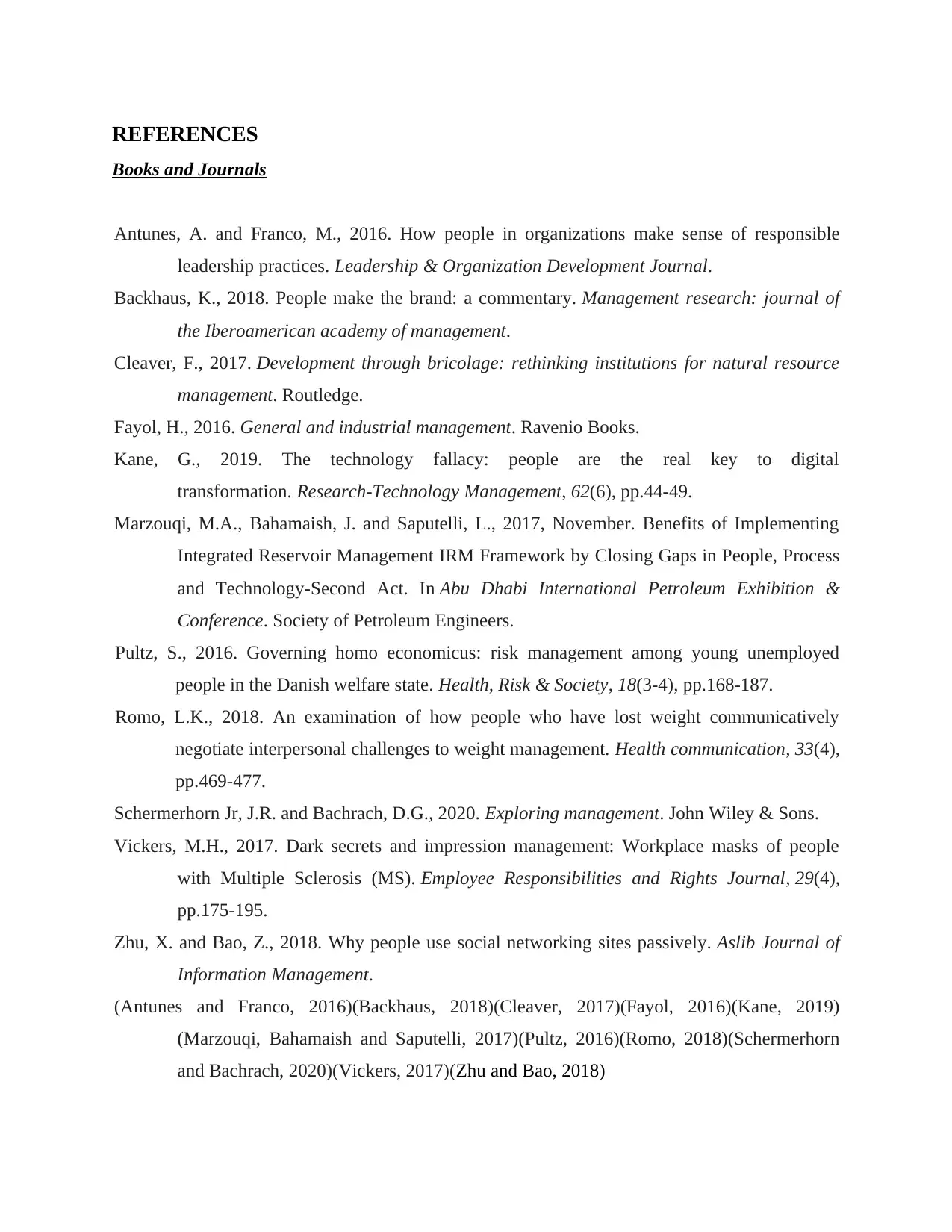
REFERENCES
Books and Journals
Antunes, A. and Franco, M., 2016. How people in organizations make sense of responsible
leadership practices. Leadership & Organization Development Journal.
Backhaus, K., 2018. People make the brand: a commentary. Management research: journal of
the Iberoamerican academy of management.
Cleaver, F., 2017. Development through bricolage: rethinking institutions for natural resource
management. Routledge.
Fayol, H., 2016. General and industrial management. Ravenio Books.
Kane, G., 2019. The technology fallacy: people are the real key to digital
transformation. Research-Technology Management, 62(6), pp.44-49.
Marzouqi, M.A., Bahamaish, J. and Saputelli, L., 2017, November. Benefits of Implementing
Integrated Reservoir Management IRM Framework by Closing Gaps in People, Process
and Technology-Second Act. In Abu Dhabi International Petroleum Exhibition &
Conference. Society of Petroleum Engineers.
Pultz, S., 2016. Governing homo economicus: risk management among young unemployed
people in the Danish welfare state. Health, Risk & Society, 18(3-4), pp.168-187.
Romo, L.K., 2018. An examination of how people who have lost weight communicatively
negotiate interpersonal challenges to weight management. Health communication, 33(4),
pp.469-477.
Schermerhorn Jr, J.R. and Bachrach, D.G., 2020. Exploring management. John Wiley & Sons.
Vickers, M.H., 2017. Dark secrets and impression management: Workplace masks of people
with Multiple Sclerosis (MS). Employee Responsibilities and Rights Journal, 29(4),
pp.175-195.
Zhu, X. and Bao, Z., 2018. Why people use social networking sites passively. Aslib Journal of
Information Management.
(Antunes and Franco, 2016)(Backhaus, 2018)(Cleaver, 2017)(Fayol, 2016)(Kane, 2019)
(Marzouqi, Bahamaish and Saputelli, 2017)(Pultz, 2016)(Romo, 2018)(Schermerhorn
and Bachrach, 2020)(Vickers, 2017)(Zhu and Bao, 2018)
Books and Journals
Antunes, A. and Franco, M., 2016. How people in organizations make sense of responsible
leadership practices. Leadership & Organization Development Journal.
Backhaus, K., 2018. People make the brand: a commentary. Management research: journal of
the Iberoamerican academy of management.
Cleaver, F., 2017. Development through bricolage: rethinking institutions for natural resource
management. Routledge.
Fayol, H., 2016. General and industrial management. Ravenio Books.
Kane, G., 2019. The technology fallacy: people are the real key to digital
transformation. Research-Technology Management, 62(6), pp.44-49.
Marzouqi, M.A., Bahamaish, J. and Saputelli, L., 2017, November. Benefits of Implementing
Integrated Reservoir Management IRM Framework by Closing Gaps in People, Process
and Technology-Second Act. In Abu Dhabi International Petroleum Exhibition &
Conference. Society of Petroleum Engineers.
Pultz, S., 2016. Governing homo economicus: risk management among young unemployed
people in the Danish welfare state. Health, Risk & Society, 18(3-4), pp.168-187.
Romo, L.K., 2018. An examination of how people who have lost weight communicatively
negotiate interpersonal challenges to weight management. Health communication, 33(4),
pp.469-477.
Schermerhorn Jr, J.R. and Bachrach, D.G., 2020. Exploring management. John Wiley & Sons.
Vickers, M.H., 2017. Dark secrets and impression management: Workplace masks of people
with Multiple Sclerosis (MS). Employee Responsibilities and Rights Journal, 29(4),
pp.175-195.
Zhu, X. and Bao, Z., 2018. Why people use social networking sites passively. Aslib Journal of
Information Management.
(Antunes and Franco, 2016)(Backhaus, 2018)(Cleaver, 2017)(Fayol, 2016)(Kane, 2019)
(Marzouqi, Bahamaish and Saputelli, 2017)(Pultz, 2016)(Romo, 2018)(Schermerhorn
and Bachrach, 2020)(Vickers, 2017)(Zhu and Bao, 2018)
⊘ This is a preview!⊘
Do you want full access?
Subscribe today to unlock all pages.

Trusted by 1+ million students worldwide
1 out of 12
Related Documents
Your All-in-One AI-Powered Toolkit for Academic Success.
+13062052269
info@desklib.com
Available 24*7 on WhatsApp / Email
![[object Object]](/_next/static/media/star-bottom.7253800d.svg)
Unlock your academic potential
Copyright © 2020–2026 A2Z Services. All Rights Reserved. Developed and managed by ZUCOL.




